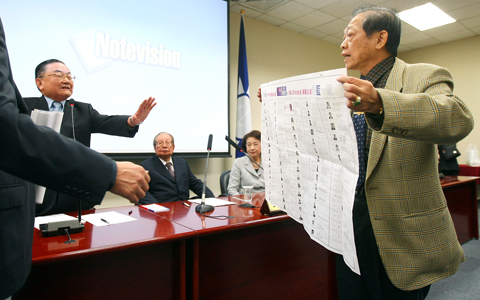The Chinese Nationalist Party (KMT) held a Central Standing Committee (CSC) by-election yesterday and said it did not receive any complaints of irregularities this time around.
“We will conduct a thorough investigation into any complaints about vote-buying allegations and mete out severe punishments, including revoking memberships,” KMT Secretary-General Chan Chun-po (詹春柏) said yesterday.
“But so far, we see only groundless allegations, and such disturbances usually happen in the run-up to all elections,” he said.

PHOTO: CNA
The by-election “was a tremendous improvement” on the one held last month, Chan said, referring to the election held on Oct. 11, after which 28 members resigned amid vote-buying allegations.
The mass resignation came on the heels of the party’s revocation of the elected status of Yang Chi-hsiung (楊吉雄) and Chiang Da-lung (江達隆) for giving gifts to party delegates.
President Ma Ying-jeou (馬英九), who doubles as KMT chairman, at the time supported the CSC by-election and called for clean elections.
The party has declined to confirm whether Ma was behind the wave of resignations.
After the resignation of CSC elected members over the Oct. 11 election, the KMT suspended the rights of 12 party members who participated in last month’s CSC election for three months amid allegations of vote buying.
The party yesterday afternoon elected 32 CSC members. The CSC has a total of 39 members, including five designated members, two youth group representatives and 32 elected members.
Chan said the party could not “run after a shadow” every time a newspaper made allegations. Party headquarters did not receive any “concrete complaints” about bribery, nor did any irregularities take place this time around, he said.
Central Committee member Yang Lai-yung (楊來勇), however, produced a sheet of paper he claimed was an allocation chart of the 32 CSC positions.
Rebutting the accusation, Chan asked Yang Lai-yung to provide names and said he had already asked party representatives eligible for the election to ignore any allocation sheet and exercise autonomy in voting.
Chan said it was wrong for individual members to behave in such a manner, but that the party could not bar any individuals from acting independently.
Ma declined to comment on the vote-buying allegations when he cast his vote at the party’s Taipei charter yesterday morning.
While only 12 of the 32 CSC members elected yesterday were newly elected and the other 20 were elected last month, Chan said it was “reasonable” to see more old faces because new faces were not widely known and had less connections with party representatives.
Chan said the new CSC line-up should help Ma’s effort to reform the party and foster party unity.
Meanwhile, Chan yesterday said he believed KMT Legislator Wu Yu-sheng (吳育昇) would handle his extramarital affair well because he is a “man.”
Wu on Friday apologized to the public for an extramarital affair after the Chinese-language Apple Daily newspaper ran a front page story on Friday with a series of pictures showing Wu and an unidentified woman arriving at a motel in Dazhi (大直), Taipei City.
Wu is considered to be one of Ma’s backers.
Describing Wu’s behavior as “individual conduct,” Chan said Wu is an adult and a legislator with a clean image, adding that Wu owed his family and the public a clear account of the matter.
Ma declined to comment on the matter yesterday.

Taiwanese can file complaints with the Tourism Administration to report travel agencies if their activities caused termination of a person’s citizenship, Mainland Affairs Council Minister Chiu Chui-cheng (邱垂正) said yesterday, after a podcaster highlighted a case in which a person’s citizenship was canceled for receiving a single-use Chinese passport to enter Russia. The council is aware of incidents in which people who signed up through Chinese travel agencies for tours of Russia were told they could obtain Russian visas and fast-track border clearance, Chiu told reporters on the sidelines of an event in Taipei. However, the travel agencies actually applied

New measures aimed at making Taiwan more attractive to foreign professionals came into effect this month, the National Development Council said yesterday. Among the changes, international students at Taiwanese universities would be able to work in Taiwan without a work permit in the two years after they graduate, explainer materials provided by the council said. In addition, foreign nationals who graduated from one of the world’s top 200 universities within the past five years can also apply for a two-year open work permit. Previously, those graduates would have needed to apply for a work permit using point-based criteria or have a Taiwanese company

The Shilin District Prosecutors’ Office yesterday indicted two Taiwanese and issued a wanted notice for Pete Liu (劉作虎), founder of Shenzhen-based smartphone manufacturer OnePlus Technology Co (萬普拉斯科技), for allegedly contravening the Act Governing Relations Between the People of the Taiwan Area and the Mainland Area (臺灣地區與大陸地區人民關係條例) by poaching 70 engineers in Taiwan. Liu allegedly traveled to Taiwan at the end of 2014 and met with a Taiwanese man surnamed Lin (林) to discuss establishing a mobile software research and development (R&D) team in Taiwan, prosecutors said. Without approval from the government, Lin, following Liu’s instructions, recruited more than 70 software

BACK TO WINTER: A strong continental cold air mass would move south on Tuesday next week, bringing colder temperatures to northern and central Taiwan A tropical depression east of the Philippines could soon be upgraded to be the first tropical storm of this year, the Central Weather Administration (CWA) said yesterday, adding that the next cold air mass is forecast to arrive on Monday next week. CWA forecaster Cheng Jie-ren (鄭傑仁) said the first tropical depression of this year is over waters east of the Philippines, about 1,867km southeast of Oluanpi (鵝鑾鼻), and could strengthen into Tropical Storm Nokaen by early today. The system is moving slowly from northwest to north, and is expected to remain east of the Philippines with little chance of affecting Taiwan,